Blue rats
It's not negative and not a photomontage. The photo has a little hope for many people to cure or relieve the effects of injury and paralysis of the spinal cord. The
researchers specifically applied to rats spinal injury, and then
introduced them to a substance akin to food color "Blue Number One",
which is absolutely bezvrednym.Ih skin had a blue tint, but, within a
week almost all the animals recovered motor function, as inflammation of the substance prevented the spinal cord. Negative effect of the drug on the body of rats were found.
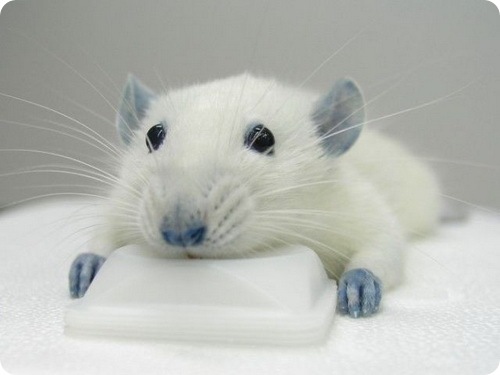
Blue dart frogs
Blue dart frogs is one of the most amazing colored animal planet. People use poison frog skin secretions of this as a component of painkillers. Local people of amphibian venom used for hunting animals.
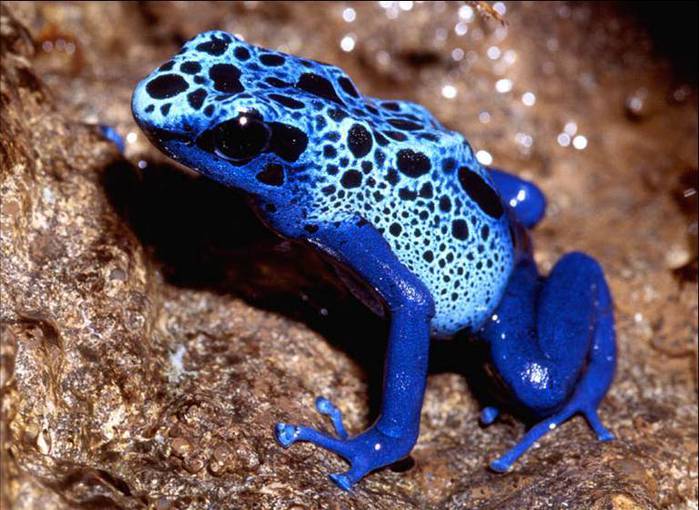
Blue parrots
Budgie blue color appeared in 1878 in Belgium. The first such specimen was grown in 1910 in France. Color of the chest, abdomen and lower back - a bright blue. The mask is white, black throat spots, partially covered with purple spots cheeks. Wavy black figure, is located on the head, neck, wings and back, clearly separated from the white base. The tail feathers are dark blue with a turquoise hue, flight feathers - black or blue.
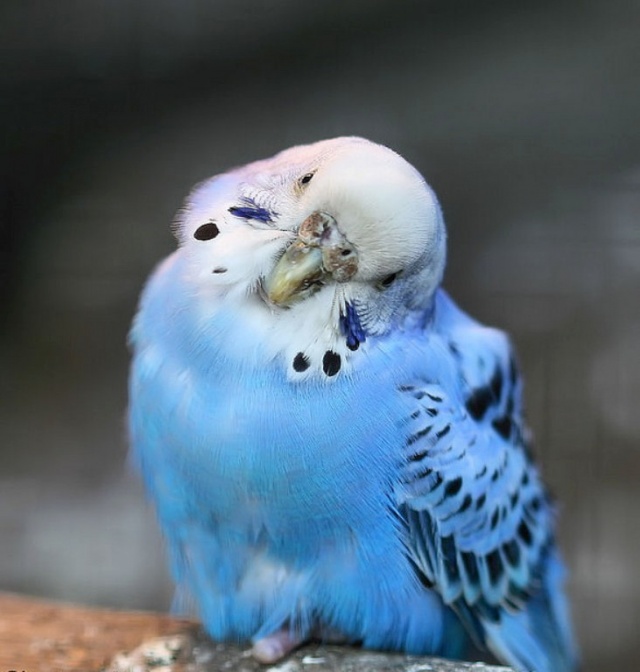
Blue (cobalt), parrots
The body is of a blue color. The mask on his head a bright white color. On the neck there are six evenly spaced black spots. Two extreme spots a little bit hidden drop-shaped purple spots. On a white background is a black figure in the form of waves. The central tail feathers are dark blue. This gives a darker color factor.
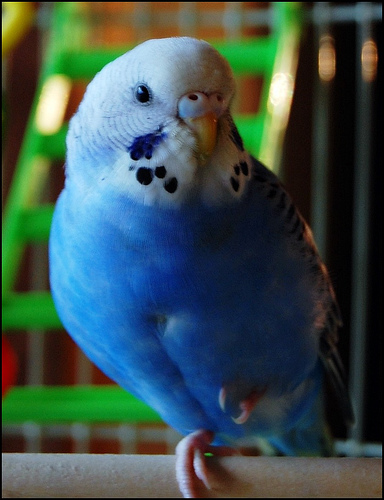
Hyacinth Macaw
This is the biggest and most expensive parrot in the world. Its
a beautiful cobalt blue color and impressive size - length of 98
centimeters and weighs about six pounds - led to the fact that in the
wild Macaw is on the verge of extinction. It is no wonder that today, wanting to buy a parrot jacinth have to shell out from 6500 to 14000 dollars. For
this money you can buy a Toyota Sorolla 2006, which, however, unlike a
parrot, do not talk to you, do not split the coconut and is unlikely to
serve faithfully for 60-80 years. Hyacinth Macaw - the perfect pet. - It's beautiful, intellectually developed, sociable and graceful. Ara quickly learns, quite deliberately, and said no hysterics - just noise in the case. The
vocabulary of parrots rarely exceed 50-60 words, but they often recite
them to the place that is associated with a specific external event of
the vocabulary word that usually makes people excited. 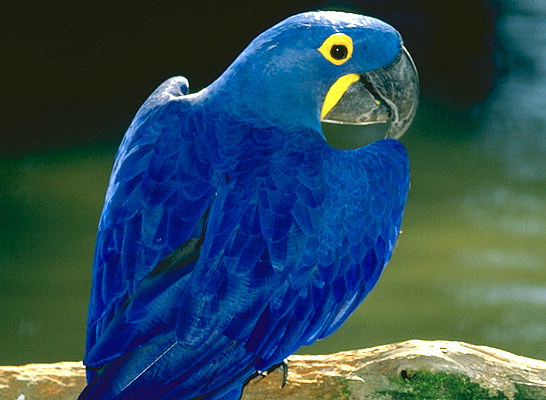
British Blue cat
British Blue (Blue BRI a) are classics of the genre, the modern practice of breeding British cats. Blue
color is obtained by the British as a result of oxidation of the black
pigment gene in the gene under the influence of diluent (delution). British Blue cat is a well-established color for a hundred years. Blue color - it is a gift inherited from the British cats cats Cartesian (chartreuse), who came to England from France.

Diademovy hedgehog
Diademovy
hedgehog, living in the Florida area, from very dark (daylight) is
converted in the dark in a pale gray with a white star in the field of
oral aperture, which is bordered by iridescent blue edge. In the skin there is a diademovyh and special cells that make these urchins glow in the dark gorgeous blue spots.

Starfish Blue links (lat.Linckia laevigata)
Blue Star of links (Linkia laevigate) - a very popular aquarium inhabitants. Individuals that live in shallow water, have turquoise or purple color, sometimes with a more languid Nettles. Stars from great depths are usually painted not so bright, they are grayish, yellowish or pinkish shades. Usually grows to 30 cm in diameter, although some specimens can reach 40 cm
Widespread in the Indo-Pacific from the east coast of Africa to Hawaii in the east, the north comes to Japan. It can be found in closed lagoons, on reef plateau and on the outer walls of the reefs.
Links are very popular aquarium inhabitants, however, to create the right conditions are not so simple. They
can occupy only a mature stable tank with plenty of live rock,
providing rich microfauna and flora that are for these stars are main
food resource. 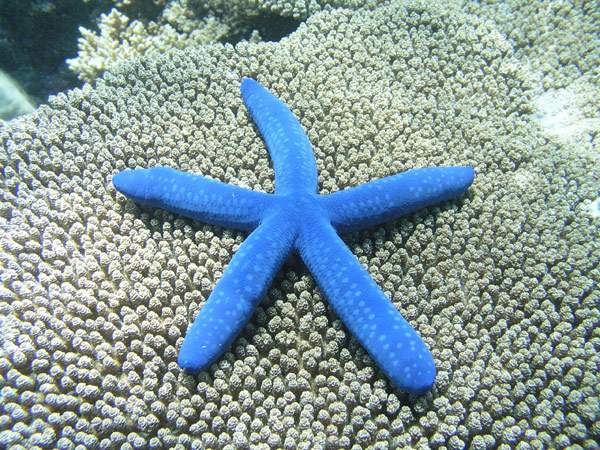
The only venomous starfish
Starfish with the name "crown of thorns" bears more than a thousand poisonous spines and eats coral polyps. It inhabits the coral reefs of the Red Sea and the Indian and tropical and the Pacific.

Lamprologus blue or zebra pyatipolosaya (Neolamprologus tretocephalus)
Lamprologus blue or zebra pyatipolosaya (Neolamprologus tretocephalus) - aquarium fish cichlid family (Cichlidae), or Tsihlovye. Latin name: Neolamprologus tretocephalus Boulenger, 1899. Synonym: Lamprologus tretocephalus. In the wild blue lamprologus lives in Lake Tanganyika, in a rocky area to the north-eastern part.
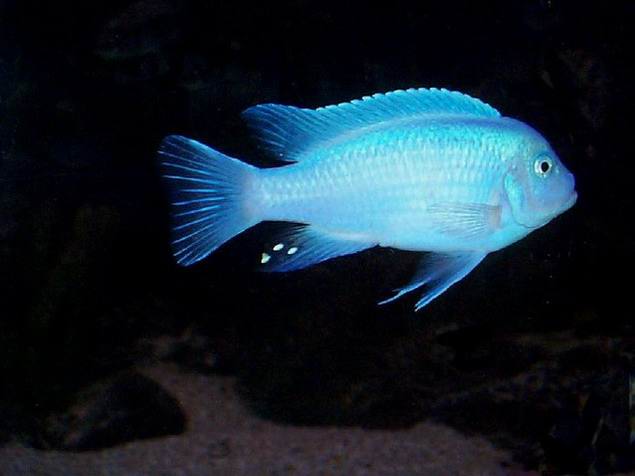
The Blue Snake (Serpentes)
At
the present time on Earth more than 3,000 species of snakes, of which
about a quarter of toxic and dangerous for animals and humans.
Snakes have mastered almost all the living spaces of the Earth, except by air. There are snakes in all continents except Antarctica. They are distributed from the Arctic Circle in the north to the southern tip of the American continent. Especially numerous snakes in the tropical regions of Asia, Africa, South America and Australia.
Snakes are mostly terrestrial life, but some species live underground, in water, in trees. At the onset of unfavorable conditions, for example, by cooling, snakes hibernate.
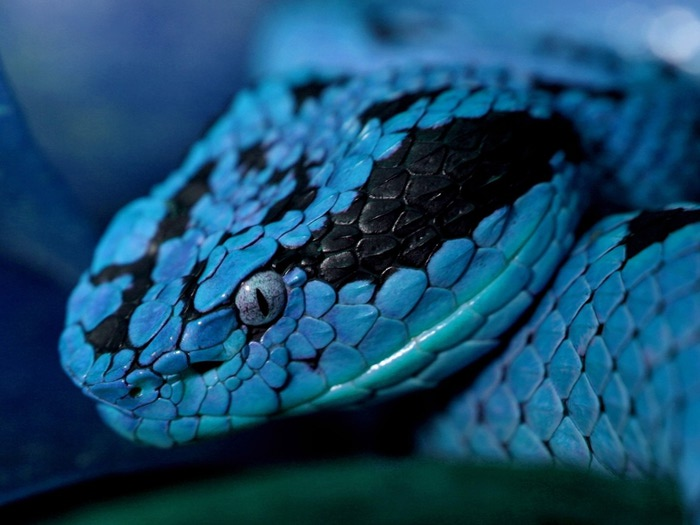
Blue Cancer (Cherax cainii)
Cherax
cainiiGoluboy cancer Cherax cainii (tenuimanus marron) belongs to the
family Parastacidae, until recently, the cancer was named Cherax
tenuimanus. His birthplace is a river in South and South-Western Australia. Like other members of the genus Cherax, the male is more subtle and progonistoe abdomen, and the more massive claws.
Color
of these cancers are usually brown, but there are also some bright blue
copies, so they just selected for the aquarium and put up for sale
separately.
Cherax
cainiiI although this handsome blue achieves a truly gigantic
proportions up to 40 cm in length and weighing up to 3 kg, it will not
remain without attention hobbyists who want to decorate your large
aquarium large and impressive pet.

The blue jay
The
size of the blue jay is about 30 inches and has a wingspan of about 42
cm Its weight ranges from 70 to 100, the characteristic feature is the
blue back, a short black crest, black necklace, blue, black and white
pattern on the wings and black and white striped tail.
Blue jays live in pairs or in small family groups. In flight form large flocks. They know how to publish a lot of different sounds, as well as to imitate the sounds of other birds, including prey. Because of this, they warn neighbors about the dangers and discourage invasive in their area.
Blue jays are monogamous lifestyle and remain faithful to your partner throughout their lives. Both parents are building in trees or bushes are not very neat vyglyadeschee nest of twigs, grass stems. Deals only with the female incubating. Twice a year, she warms about 17 days pending 3.6 eggs with green or brown blotches. Twenty days after the birth of young chicks begin to fly.
The area of distribution extends from the blue jays and Eastern United States southern Canada to the Gulf of Mexico. In English, this bird is called the Blue Jay.

The Blue Duck
Blue or blue duck (Vaio) - a rare waterfowl.
Endemic to New Zealand. It is unique and not comparable with any other duck in the world. This
duck has appeared at an early stage in the evolution of birds at a time
when New Zealand was isolated from other parts of the world.
Duck inhabits clean rivers fleeting with a large number of aquatic insects and are extremely rare in the morning or at sunset. In
contrast to the 158 waterfowl that occasionally swim in the waterfalls
and swift river, it is the only one who lives in the fast water and the
waterfalls of the time. Moreover, here it is nesting chicks and displays. Her presence - an indicator of the purity of the reservoir.
A
characteristic feature - the black and blue feathers, sleek head, broad
webbed paws and sharp cry of the male "Vaio" who heard of the
waterfall. Amazing ability to maneuver the blue duck and swim toward the strong current. At the top of the beak is soaking, or "lip" that allows you to lick the insects from the rocks. Blue duck feed the larvae of aquatic insects.
Blue ducks are territorial year-round and violently expel aliens from their territory. 
Little Blue Heron
Little Blue Heron (Latin Egretta caerulea) - birds view of the kinds of egrets.
These dark gray herons can be found near standing water in the tropics and subtropics of America. In
the Andes, they saw at an altitude of 2500-3000 m, single individuals
rises to a height of 3750 m feed on insects and other arthropods. Food is mined in shallow water or land. They nest in colonies with numerous, numbering hundreds of nests on the ground, in bushes or low trees.
Wingspan - 60 cm, weight - 325 g Color mainly dark blue, light legs. 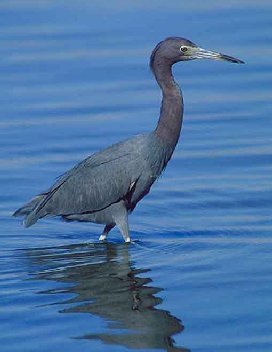
The blue shaded
Blue
Diamond, Violet Sapphire (Blue Diamond, Sapphire Violet) - perhaps the
most beautiful and rare mutation of vseh.Eto double recessive mutation.
This is a very long and laborious process, but the result exceeds all expectations.
Blue Diamond is obtained from crosses of purple and sapphire chinchillas in several stages, ie, This color contains two violet sapphire and 2 genes simultaneously. This
means that when you cross the Blue Diamond with a simple standard for
all the kids are going to the standard bearers of violet and sapphire at
the same time.
Chinchillas Blue Diamond color pale blue color with good contrast, color similar to the metal.
Some
believe that there is a separate gene blue diamond, but this is very
misleading inexperienced and young breeders - this is not the gene. Blue Diamond is a sapphire, and a violet one. Experienced
and competent breeders do not release this gene as a separate, but at
the same time carriers of chinchillas violet and sapphire gene can write
as a "medium blue diamond", this is equivalent to "the bearer of
sapphire and violet." 
Blue eared pheasant
Blue
eared pheasant (Latin Crossoptilon auritum) - Bird family
fazanovyh.Rasprostranen in the mountain forests of central Kitaya.Eto
pretty big bird reaches a length of 96 cm or more. Blue-gray
plumage, a wreath on his head of dark purple, beak and long neck
feathers white tsveta.Pitaetsya this pheasant mostly berries and
vegetable plants. 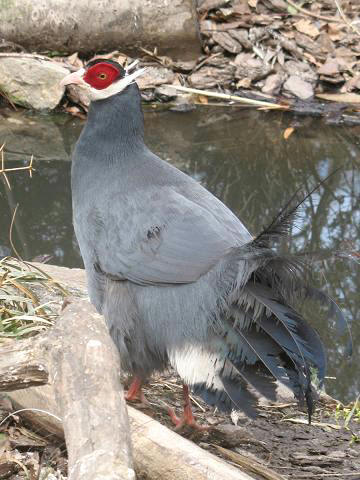
Blue whale
Blue
Whale (also blue whale, blue whale, or, Lat. Balaenoptera musculus) -
marine animal of the order Cetacea, referring to the mustached whales
(genus of baleen whales). The largest whale, and probably the largest of all animals that ever lived on Earth. Its length reaches 33 meters, and weight can significantly exceed 150 tons.
The blue whale is a typical representative of baleen whales that feed on plankton. It has a well-developed filtering apparatus formed plates of baleen. Blue whales feed mainly on krill, rarely larger crustaceans, small fish and cephalopods.
In the Indian Ocean blue whales are found year round in equatorial waters. They can very often see in Ceylon and the Maldives, somewhat lower in the Seychelles and the Gulf of Aden.
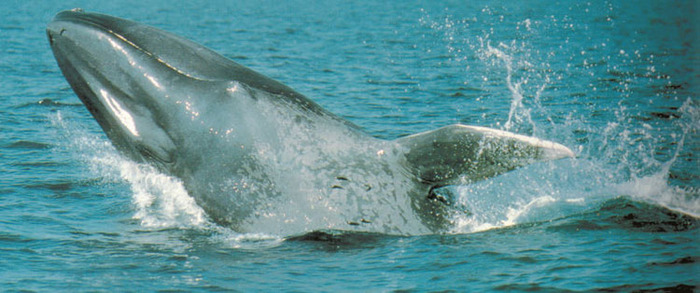
Blue Tiger
Subspecies of tiger, reported that, in general, come from the Fujian province in China, as well as from Korea. Remarkable blue color with dark gray stripes. These tigers are also called the Maltese, by analogy with domashniki cats Golob color. However,
the Blue Tigers have nothing to do with the island
Malta.Suschestvovanie these tigers also confirms the fact that cats are
well-known Maltese color: Russian Blue, British Shorthair, Blue British. There are also blue rysi.Sudya the number of observations, the population of blue tigers can count up to 30 individuals. To date, the blue tiger is one of the most mysterious big cats in the world.
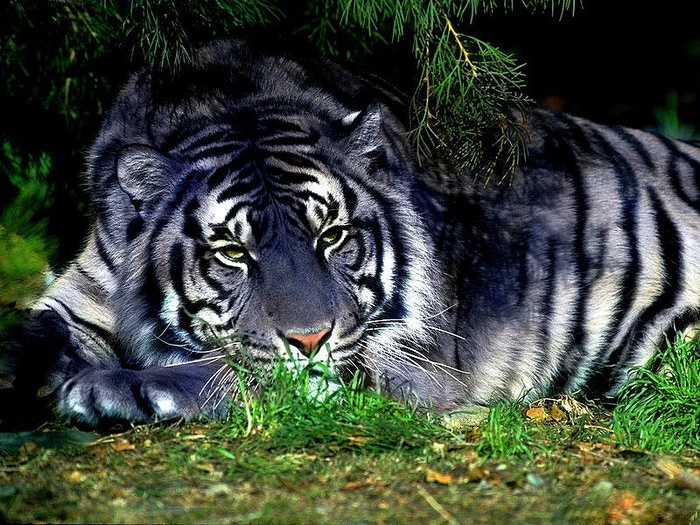
Blue ribbon
The
blue ribbon, blue lentochnitsa (Latin Catocala fraxini) - a large moth
of the family Scoops (Noctuidae). The largest of our lentochnits and one
of Europe's largest shovel - the length of the front fender can be up
to 4.5 cm and a wingspan of - 110 mm (range - 85 to 110 mm).
Paint
the front wings, "blue-light-gray with black-pollination" and the
light, to white, with transverse lines, surrounded by a border. Reniform spot light, with a dark border, and beneath it is a bright white spot, or even irregular shapes. Wavy
picture mimics a piece of tree bark and is used for the protection of
butterflies, when the day she sits quietly on the trunk. The hind wings are black or dark brown, with a broad blue stripe (sash) and a white fringe. The band is not toothed, and semicircular.
The name given to a blue butterfly on the wings of the band, which looks like a ribbon or band.

Rhytidoponera metallica
Ritidoponera best known for its colorful appearance: beautiful iridescence from green to blue. Local and called it - "green-ant."
Green-ant is common in Australia. It prefers urban areas, such as: parks, courtyards and gardens. Forages singly, sometimes activating passive foragers to rally action, or to increase furazhirovochnoy zone. In this case, subspecies living in damp conditions - forested areas - forages during the day, and dry sub-species at night. Ritidoponera
preimuschstvenno predator, but are required in the diet of seeds and
berries are rich in carbohydrates, does not shy away from hiking in the
pasture, and scale insects AFIDE for collecting honeydew.
Their nests, ritidoponera builds in decaying wood. And if not, then digs a hole, leaving mounds on the surface. Moreover, these hills are often camouflaged with rocks and pieces of various plants.

Violet carpenter bee
Violet carpenter bee (latin Xylocopa violacea) - kind of solitary bees of the family Apidae. Large solitary insect, one of the five species of Palaearctic subgenera Xylocopa genus Xylocopa.
It occurs mainly in southern Europe, the Caucasus, Turkey, the Middle and Near East. In Ukraine, widespread in the Crimea, but also found in southern regions. Included
in the Red Book of Ukraine is protected in Crimea, Yalta
mountain-forest, Karadag, and Kazantip Opuksky reserves and reserve "Mys
Martian."

2018
8 years ago









0 comments:
Post a Comment